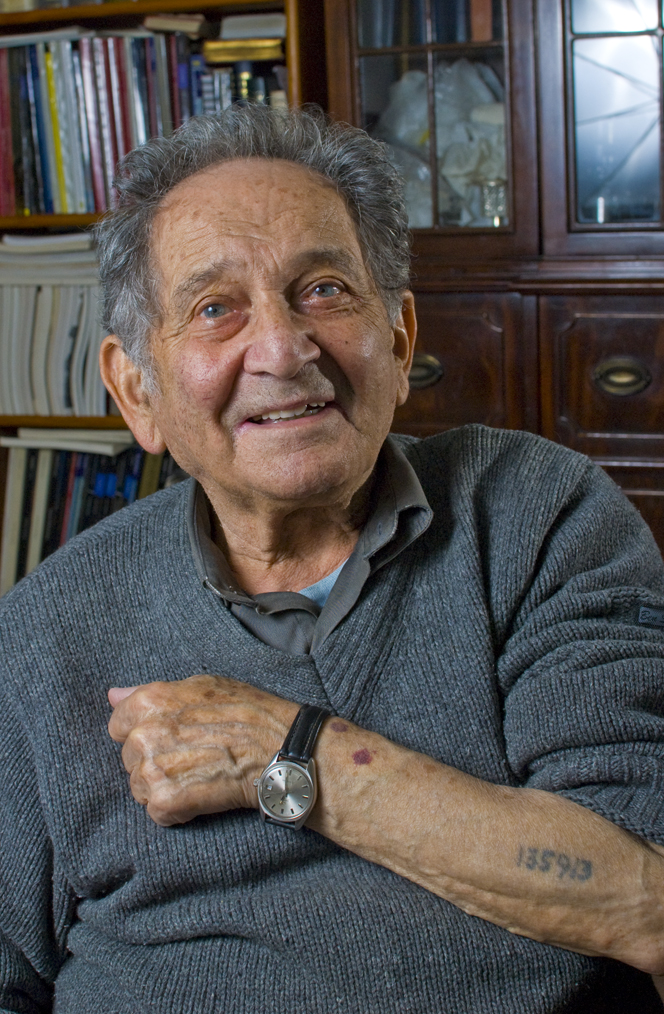He was born in Będzin, a small town in southern Poland, populated mostly by Jews. His father was a tailor. In 1939, the occupation of the country began, and young Sam Pivnik learned very quickly what its nature would be:
I remember very well Friday, September 8. On that day, the Einsatzgruppen appeared in the city (…) from time to time you could hear the echoes of gunshots, and then, as the afternoon turned into evening, I smelled the scent of burning (…) our synagogue, the symbol of my nation, was on fire (…) the Einsatzgruppen had been doing their job all weekend. On the streets, there were laying dead bodies (…) the most terryfying was the scene of the hanging in the trees near the square.
In 1943, the Pivniks were sent to the ghetto, and a few months later they were sent to Auschwitz-Birkenau. On the ramp, his sister and him survived the selection. The rest of the family was then transported to a gas chamber. Soon Sam Pivnik was sent to a commando working on the ramp, and his job was to pick up the belongings that were left behind by the people from the transport brought in. The job provided the young prisoner with access to abandoned food and valuables so he could survive in the camp.
I am not proud of my work on the ramp. I became, like everyone there, a human hyena. The floor of an emptied wagon was sometimes a real treasure island (…) any food we found, bread, cheese, sausage, we ate right away while collecting our luggage –he said.
Working on the ramp, he saw Josef Mengele’s selections many times. When he ended up in the camp hospital with typhoid fever, he himself avoided being selected by the Angel of Death. After recovering, he was placed in a commando working in a coal mine. On January 19, 1945, less than a week before the liberation of Auschwitz, he set off westward on a death march. Rushed prisoners were sent to successive camps, while some places refused to accept them, such as Buchenwald. Ultimately, Pivnik ended up in northern Germany, on the Bay of Lübeck. “Cap Arcona” was moored in the bay and made a huge impression on Sam Pivnik:
I had never seen the sea before. The Baltic seemed especially mysterious to me because of the fog that merged with its gray waves. (…) A gray ship emerged in front of us. It had three chimneys and was really huge. I had never seen such a ship before, not even in a picture.
He remembered boarding and then being placed among other prisoners just as clearly:
I was first struck by the smell. As my eyes became accustomed to the pale electric lighting, I saw the heads and shoulders of a mass of prisoners, crowded together like sardines in a can. The smell told me that these people had spent quite a few days in this floating concentration camp. We realized that the dead were thrown overboard, and their bodies floated like human waste. Even our SS men were shocked.
Ships moored in the bay were easy targets for Allied aviation. The British even issued warnings when an attack was about to take place. However, the Germans deliberately did not mark the ships with red cross signs or lower the flag as a sign that the ship’s crew was surrendering. This is because everything was calculated to get rid of the prisoners “by the hands” of British airmen. The attack Sam Pivnik remembered perfectly:
[The rockets] hit the ship with an unimaginable bang. Then there was the most terrible sound I have ever heard in my life, it came from somewhere down below, and it took me a moment to realize what it was. It was the scream of thousands of terrified people, echoing through the corridors and stairwells of the ship. “Arcona” trembled and I smelled the stench of burning (…) Panic was widespread. “Arcona” was on fire, I knew only one thing, I had to escape from the ship. (…) I was about 20m from the water – the height of a nine-story house.(…) I held my breath and jumped. I fell too short for life to scroll before my eyes. I hit the water as if it were a concrete wall.
In the water, he was not safe, at risk of drowning, hypothermia and SS bullets. Fishermen boats were helping the Nazis and the staff of the ship, shhting the prisoners trying to get on the boats. Pivnik himself got ashore, and the next day, along with British soldiers, came freedom.
